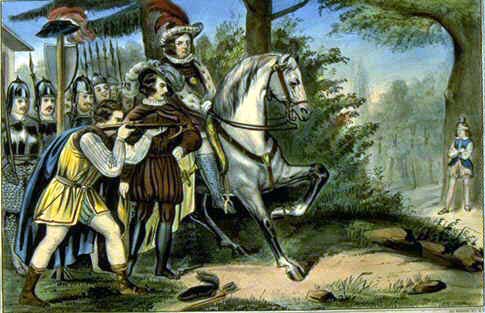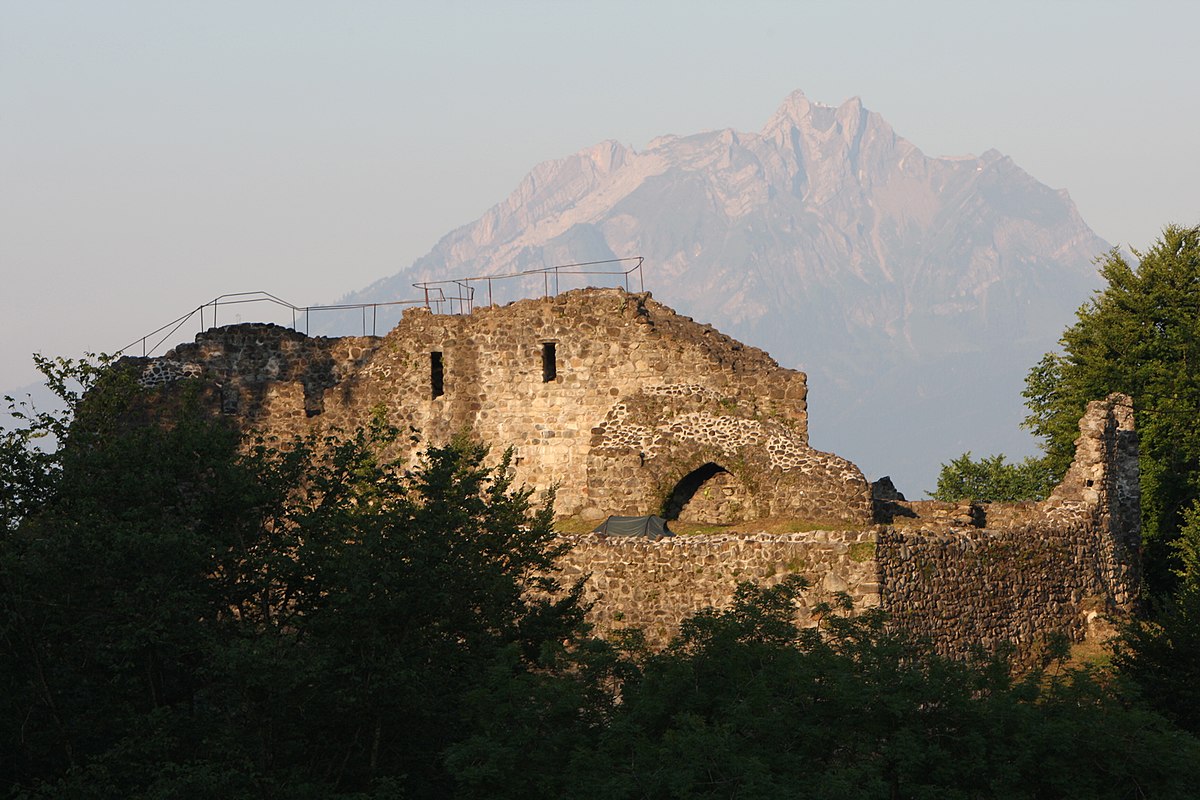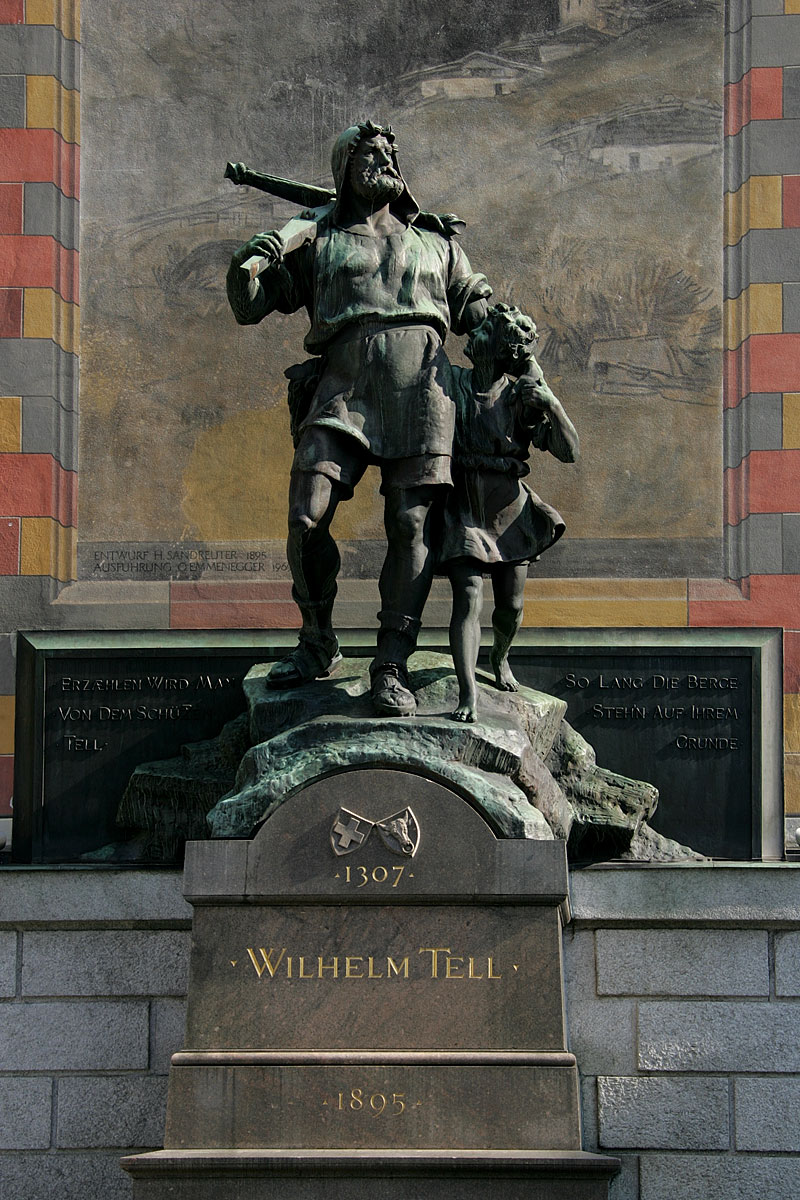William Tell is the great Swiss hero you kinda know about (unless you're Swiss). He is most famous for having shot an apple off his son's head, and for most people, that is the end of their William Tell knowledge. However, William Tell is also a sign of resistance, liberty, and independence. He is one of the most renowned people in Swiss history, and he may not have been real.
To understand why William Tell is such a big deal, you have to understand Swiss history. In the early 13th century several groups of Celtic, Germanic, and French people living in the Alps decided that they didn't have much in common with the surrounding countries, so they banded together to form one country.
This wasn't really a problem with the rest of Europe, because at the time the rest of Europe didn't really know or care about Switzerland. High up in their mountains, the Swiss were essentially a group of farmers who didn't even speak the same language. However, all that changed in the mid 1200s, when a bridge across the St. Gotthard's pass was constructed, connecting Switzerland and Italy via land.
A convenient land route between Northern Europe and Italy was a pretty big deal. The Italians had some pretty dope stuff, and everyone wanted to do business with them. However, because of the Alps and the Apennines, Italy was very difficult to get to via land. Sure, you could take a boat, but hiring a ship was expensive, especially if you lived in a landlocked country. In addition to being costly, shipping was risky and time consuming. It was much safer and easier to spend three days trekking through the Uri Canton of Switzerland than it was to spend weeks on a boat.
After construction of the bridge, the people of the Uri canton were doing very well. Travelers had to pay locals for food and shelter, as well as to rent mules to carry their goods through the pass. However, as time went on there began to be some civil unrest. By 1257 the Uri people thought it best to appeal to their nearest nobleman--Rudolph von Hapsburg--to settle their internal issues. Rudolph agreed most readily.
In late 1257 Rudolph marched his armies into Switzerland, and just sorta stayed. The Swiss had, effectively, invited a wolf to a sheep's dinner party, and the wolf was taking full advantage of this. As expected, the Swiss were none too pleased with this, and began to act out.
Skip ahead to 1291--or 1307 depending on the account. In the town of Altdorf a pro-Hapsburg sheriff--Gessler has placed a Hapsburg hat on a pole in the middle of the square. All people passing it are required to bow to it to show their respect for the Hapsburg family.
Enter William Tell. A simple farmer and expert marksman from Burglen, William doesn't particularly care for the Hapsburgs, and he doesn't care who knows it. He doesn't bow to the hat, and this makes Gessler angry.
So, in his fit of rage, Gessler does what any reasonable officer of the law would do in that situation--he forces Tell to endanger the life of his son. Gessler informs Tell that he must shoot an apple off of his son's head. Should Tell miss the apple, both he and his son will be executed.
Tell is, of course, reluctant to shoot an armor piercing projectile at many kilometers per hour at his son, no matter how good of a marksman he may be. However, his son encourages him to make the shot, so William does. And, because he is so amazing, William splits the apple in half, and it falls off of his son's head. Gessler congratulates Tell on his amazing shot, but stops to ask him a question. Before taking the shot Gessler saw William conceal a second arrow in his jacket. What was that about?
Never one to stop pushing his luck, Tell informs Gessler that, had he missed and killed his child, the second arrow would have been for Gessler. This makes Gessler angry, and he orders his cronies to slap William in irons, and put him on a boat bound for the dungeon at Kussnacht castle.
While on the boat a big storm blows up on the lake. Gessler releases William from his chains, because in addition to being an excellent marksman, and the king of sass, William is also an excellent sailor. Living up to his reputation, William guides the boat to safety in an outcropping of rocks. However, when the boat touches the rocks, William leaps out, and pushes the boat back into the sea.
Coming to the conclusion that Gessler and his men would probably survive, William finds them after they land, and ambushes the sheriff's party, killing them all. Then, with three other friends, William swears a pact to rid Switzerland of the Hapsburg troops, and free them from their oppression. This is, essentially, the start of the Swiss War for Independence.
Now, as with many heroic figures from this time period, it is difficult to ascertain if they actually lived or not. The tale of William Tell wasn't put to paper until centuries after the events that supposedly occurred, and sources disagree about the year in which it occurred. Additionally, there are no parish records of a William Tell living in that time. However, while it may be difficult to prove the actual physical existence of a 13th (or 14th) century man named William Tell, there is no need to prove how big of an impact Tell has had on Swiss culture.
William Tell is, essentially, the Swiss national hero. He's a symbol of Swiss bravery and ingenuity. His iconography is famous--he appears on coins, there are statues of him around the country, and his crossbow appears on every item exported by the Swiss. Every time the Swiss are threatened with war or invasion, his myth comes alive again, fueling the fires of Swiss nationalism. While he may not have lived, his influence is undeniable.
Sources
In Search of William Tell
William Tell--Swiss Hero
Who Was William Tell?
The Legend of William Tell
 |
| William Tell depicted on a 1970 postage stamp |
This wasn't really a problem with the rest of Europe, because at the time the rest of Europe didn't really know or care about Switzerland. High up in their mountains, the Swiss were essentially a group of farmers who didn't even speak the same language. However, all that changed in the mid 1200s, when a bridge across the St. Gotthard's pass was constructed, connecting Switzerland and Italy via land.
A convenient land route between Northern Europe and Italy was a pretty big deal. The Italians had some pretty dope stuff, and everyone wanted to do business with them. However, because of the Alps and the Apennines, Italy was very difficult to get to via land. Sure, you could take a boat, but hiring a ship was expensive, especially if you lived in a landlocked country. In addition to being costly, shipping was risky and time consuming. It was much safer and easier to spend three days trekking through the Uri Canton of Switzerland than it was to spend weeks on a boat.
After construction of the bridge, the people of the Uri canton were doing very well. Travelers had to pay locals for food and shelter, as well as to rent mules to carry their goods through the pass. However, as time went on there began to be some civil unrest. By 1257 the Uri people thought it best to appeal to their nearest nobleman--Rudolph von Hapsburg--to settle their internal issues. Rudolph agreed most readily.
In late 1257 Rudolph marched his armies into Switzerland, and just sorta stayed. The Swiss had, effectively, invited a wolf to a sheep's dinner party, and the wolf was taking full advantage of this. As expected, the Swiss were none too pleased with this, and began to act out.
 |
| William Tell shooting the apple off of his son's head |
Enter William Tell. A simple farmer and expert marksman from Burglen, William doesn't particularly care for the Hapsburgs, and he doesn't care who knows it. He doesn't bow to the hat, and this makes Gessler angry.
So, in his fit of rage, Gessler does what any reasonable officer of the law would do in that situation--he forces Tell to endanger the life of his son. Gessler informs Tell that he must shoot an apple off of his son's head. Should Tell miss the apple, both he and his son will be executed.
Tell is, of course, reluctant to shoot an armor piercing projectile at many kilometers per hour at his son, no matter how good of a marksman he may be. However, his son encourages him to make the shot, so William does. And, because he is so amazing, William splits the apple in half, and it falls off of his son's head. Gessler congratulates Tell on his amazing shot, but stops to ask him a question. Before taking the shot Gessler saw William conceal a second arrow in his jacket. What was that about?
 |
| The remains of Kussnacht-renamed Gessler--Castle. Like Many Hapsburg era castles, Gessler Castle was torn down during the effort to drive the Hapsburgs out of Switzerland. |
While on the boat a big storm blows up on the lake. Gessler releases William from his chains, because in addition to being an excellent marksman, and the king of sass, William is also an excellent sailor. Living up to his reputation, William guides the boat to safety in an outcropping of rocks. However, when the boat touches the rocks, William leaps out, and pushes the boat back into the sea.
Coming to the conclusion that Gessler and his men would probably survive, William finds them after they land, and ambushes the sheriff's party, killing them all. Then, with three other friends, William swears a pact to rid Switzerland of the Hapsburg troops, and free them from their oppression. This is, essentially, the start of the Swiss War for Independence.
 |
| William Tell Monument in Altdorf |
William Tell is, essentially, the Swiss national hero. He's a symbol of Swiss bravery and ingenuity. His iconography is famous--he appears on coins, there are statues of him around the country, and his crossbow appears on every item exported by the Swiss. Every time the Swiss are threatened with war or invasion, his myth comes alive again, fueling the fires of Swiss nationalism. While he may not have lived, his influence is undeniable.
Sources
In Search of William Tell
William Tell--Swiss Hero
Who Was William Tell?
The Legend of William Tell

No comments:
Post a Comment
Thank you so much for commenting! We have turned on comment moderation in order to cut down on the amount of spam and promotional material being sent to us. Provided your comment is not attempting to sell something, your comment will be published within the next 48 hours.